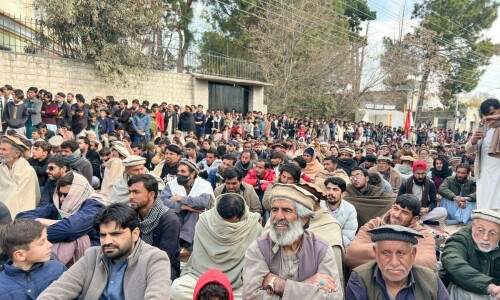ISLAMABAD: Human rights activists on Thursday criticised the private members’ National Commission for Minorities Bill recently introduced in the National Assembly.
At a press conference organised by the Centre for Social Justice (CSJ) and People’s Commission for Minorities Rights (PCMR), the activists, including Peter Jacob, Dr A.H. Nayyar, Shafique Chaudhry, Nabila Feroze Bhatti and Fatima Atif, argued that the bill was in conflict with the UN Paris Principles regarding national human rights institutions. They urged the government to introduce a treasury bill to establish an independent, autonomous and effective National Commission for Minorities Rights.
Peter Jacob, the executive director of CSJ, voiced civil society’s concerns and said the bill was a flawed imitation of a previous bill passed by the National Assembly but later dropped by the Senate. He lamented the lack of consultation with civil society organisations, indicating a lack of seriousness in establishing a genuine minorities’ commission.
He said the commission should focus on protecting and promoting minority rights and addressing violations. He noted that assigning the commission tasks related to the protection, rehabilitation and preservation of places of worship deviated from the functions of a national human rights institution. He also stressed the need for meritorious appointments to the commission.
Rights activists urge govt for a treasury bill to set up independent, autonomous and effective national commission
Dr Nayyar, an academic, researcher and PCMR member, argued that the commission should function as an independent human rights institution rather than a religious body. He recommended removing the proposed representation of the Council of Islamic Ideology (CII), the Ministry of Religious Affairs and the Evacuee Trust Property Board (ETPB) from the bill to maintain the commission’s independence similar to other national commissions on human rights, child rights and women’s rights.
Nabila Feroze Bhatti cited the Supreme Court’s 2014 directive, which called for establishing a minority rights body to monitor and promote the practical realisation of minority rights. She emphasised the need for an empowered body to fully implement the court’s directive.
Shafique Chaudhry urged the government to engage with key stakeholders to draft a comprehensive bill and introduce legislation that aligns with the UN Paris Principles. This, he said, would effectively protect and promote minority rights in Pakistan.
Fatima Atif, a human rights activist, added that coalition partners of the federal government, including PML-N, PPP and MQM, had pledged in their 2024 election manifestos to establish a statutory national commission for minority rights. She urged political parties in parliament to enact strong legislation to fulfil this promise, noting that civil society had consistently raised concerns over the establishment of ineffective minorities’ commissions under federal ministries through executive orders since 1990.
These commissions, she noted, had failed to make significant progress toward policy reforms and remedying violations of minority rights due to limited mandates, lack of independence, and inadequate resources.
Published in Dawn, July 12th, 2024













































Dear visitor, the comments section is undergoing an overhaul and will return soon.